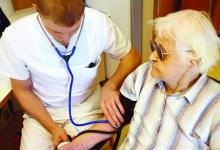Treat to lower a persistent systolic blood pressure of 150 mm Hg or more in patients aged 60 years or older who are otherwise healthy, the American College of Physicians and the American Academy of Family Physicians recommended in a new guideline for managing blood pressure in older patients.
The recommendation was “strong,” based on high-quality evidence from the 24 studies reviewed. The groups also made a weak recommendation based on lower-quality evidence to keep systolic blood pressure below 140 mm Hg in patients aged 60 years and older who have a history of stroke, transient ischemic attack, or high cardiovascular risks.
Blood pressure targets for older patients are controversial, but the recommendations are largely in line with recent advice from other organizations, including the Eighth Joint National Committee (JAMA. 2014 Feb 5;311[5]:507-20).For those patients who are otherwise well, “most patients aged 60 years or older with a SPB [systolic blood pressure] of 150 mm Hg or greater who receive antihypertensive medications will have benefit with acceptable harms and costs from treatment to a BP target of less than 150/90 mm Hg,” according to the guideline’s authors.
“Although some benefit is achieved by aiming for lower BP targets, most benefit occurs with acceptable harms and costs in the pharmacologic treatment of patients who have an SBP of 150 mm Hg or greater,” said the authors, led by Amir Qaseem, MD, PhD, ACP’s vice president of clinical policy (Ann Intern Med. 2017 Jan 17. doi: 10.7326/M16-1754).
Meanwhile, treating hypertension to an SBP of 130-140 mm Hg in older adults with previous transient ischemic attacks or strokes reduces stroke recurrence, according to the guideline. In addition, an SBP of less than 140 mm Hg “is a reasonable goal for some patients with increased cardiovascular risk,” including those with vascular disease, diabetes, chronic kidney disease, or metabolic syndrome.
Trials with lower BP targets had higher rates of hypotension, electrolyte abnormalities, abnormal renal function, cough, and withdrawals because of side effects.
Older “patients might theoretically benefit from more aggressive BP treatment because of higher cardiovascular risks,” the guideline authors noted. “However, they are more likely to be susceptible to serious harm[s] from higher rates of syncope and hypotension, which were seen in some trials. Moreover, the absolute benefits of more aggressive BP treatment in elderly persons, those with multimorbidity, or those who are frail are not well known, given limitations of the trials.”
The advice is based on 21 randomized, controlled trials of hypertension treatment intensity through September 2016, plus three observational studies of harms. Antihypertensive selection varied widely across the studies. The guideline notes the various lifestyle and pharmacy options, but did not recommend any specific treatment.
Nine trials provided high-strength evidence that BP control to less than 150/90 mm Hg reduces mortality (relative risk, 0.90; 95% confidence interval, 0.83-0.98), cardiac events (RR, 0.77; 95% CI, 0.68-0.89), and stroke (RR, 0.74; 95% CI, 0.65-0.84), according to the evidence review (Ann Intern Med. 2017 Jan 17. doi: 10.7326/M16-1754).
Low- to moderate-strength evidence suggested targets at or below 140/85 mm Hg in older people, but there was only a modest decrease in cardiac events (RR, 0.82; 95% CI, 0.64-1.00) and stroke (RR, 0.79; 95% CI, 0.59-0.99), and a statistically insignificant trend toward fewer deaths (RR, 0.86; 95% CI, 0.69-1.06).
Evidence was insufficient for targeting treatment according to diastolic BP.
Patients have to be involved with decisions about BP targets. Ongoing discussions about the risks and benefits of target options need to be a part of routine care, the guideline authors said.
The work was funded by ACP and the U.S. Department of Veterans Affairs. The authors had no disclosures.


